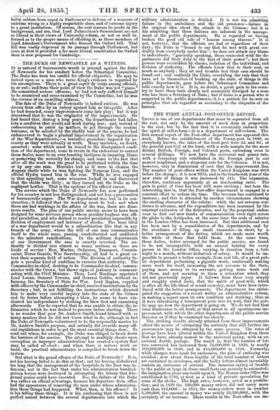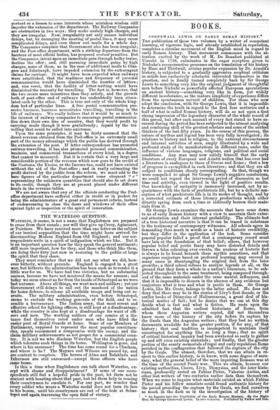THE FIRST ANNUAL POST-OFFICE REPORT.
THERE is one of our departments that must be separated from all the rest, not only by the amount of work done in proportion to the cost, but by the fact that it is essentially imbued with the spirit of self-reform—it is a department of self-reform The first annual report of the Post-office department has appeared this week. Before the establishment of the Penny-post in '1840, as everybody knows, the rates of the local post were 2d. and fick, of the general post Old. at the least, with a wide margin fertile more distant British, Foreign, and Colonial posts, extending even to several shillings. We now-have the universal and penny rate, with a fourpenny rate established in the Foreign post to our nearest neighbour, and a sixpenny rate for the Colonies. It is not, however, only in diaainutien of cost that the improvement lies. The number of post-offices within the United Kingdom was 4028 before the change ; it is now 9973, and in the fourteenth year of the new state of things it was increased by 515. The expansion, therefore, continues apparently at an accelerating ratio. The gain in point of time has been still more striking ; but here tha interesting fact is, that the Post-office department is engaged in a constant effort to reduce the time. The revenue has continued to increase ; and this is attended by another circumstance showing the sterling character of the reform: while the net revenue con- tinues to advance, and the expenditure has been increased by the constant extension of- the deliveries, and by the perpetual endea- vour to find out new tracks of communication even right across the globe to the Antipodes at the same time the scale of salaries in the London Office has been increased. But that additional cost has been met by a consolidation of the departments, and by the avoidance of filling up small vacancies—in short, by a better arrangement of the duties, which are made more worth the while of those that fulfil them. At the same time, those duties, better arranged for the public service, are found to be not incompatible with an annual holiday for every person in the London Office, varying in duration from a fort- night to a month, without deduction of salary. It would be im- possible to present a better example, from real life of a great pub- lic department performing agigantic work, continually making more work for itself, increasing the net revenue to the State, paying more money to its servants, getting more work out of them, and yet securing to them a relaxation which they did not previously enjoy. It follows from these very simply and roughly stated facts, that the spirit of good-will, wino is after all the life-blood of sound economy, must have been intro- duced with the better arrangements. The department has antici- pated the suggestion of a recent writer on administrative reform, in making a report upon its own condition and working ; thus as it were introducing a transparent pane into its wall, that the pub- lic may see how the department is going on. We do not find that total hinderance to all work, or that arrest to all spontaneous im- provement, with which the other departments of the public) service threaten us if they be examined too closely.
The striking results already attained from these improvements afford the means of estimating the certainty that still further im- provements may be obtained by the same process. The rates of postage have been altered within the United Kingdom from those that we have already named to the universal penny, with an oc- casional double postage. The result is that the number of let- ters conveyed has increased from 76,006,000 in 1839, to nearly 169,000,000 in 1840, and to 443,000,000 in 1854. Formerly, while charges were made for enclosures, the plan of enclosing was avoided ; now about three-fourths of the total number of letters are contained in envelopes, and the bulky letters almost invariably contain an enclosure or severaL The immense saving of trouble to the public at large in these small facts can scarcely be estimated ; the imagination alone can touch upon it. The Money-order Office was established in 1792, at first as a kind of private speculation for some of the clerks. The high rates, however' acted as a prohibi- tion; and in 1839 the 190,000 money-orders did not carry more cash than 313,0001.: in 1854, the money-orders were in number 5,500,000, the amount in money was nearly 10,500,0001., with the certainty of an increase. These results in the Post-office are int- portant as a lesson to some interests whose mistaken wisdom still impedes the extension of the department. The Railway Companies are obstructive in two ways ; they make unduly high charges, and they are irregular. Now, irregularity not only causes individual delays, bat, by deranging the meeting of postal lines, it may cause complicated delays, and even throw out mails for a whole day. The Companies complain that Government also has been irregular; and the Post-office department, with a striking departure from the hanteur of most official bodies, has proposed mutual penalties. But the Companies, intent upon an immediate gain through bulky trains, decline the offer ; and, still pursuing immediate gains by high °barges, some of them, as in the case of additional mails to Glas- gow and Edinburgh, have impeded extension by the extravagant claims for carriage. It might have been expected when railways were established, that the readiness and frequency of y ersonal communication would have diminished the number of letters ; and, vice versa, that the facility of letter-writing would have diminished the necessity for travelling. The fact is, however, that the two create mere incentives than they satisfy, and the growth both of post-offioe and of railways has undoubtedly been stimu- lated each by the other. This is true not only of the whole king- dom but of particular lines. A free postal communication pro- motes business, business necessitates travelling, travelling is the life of railways. We really believe that it would be so much to the interest of railway companies to encourage postal communica- tion down their own line of country, that they would profit by carrying mails though it were gratuitously ; repaid by the tra- velling that could be called into existence.
Upon the same principles, it may be fairly assumed that the direct revenue obtained from the Post-office is an extremely small part of the money advantage which the public has derived through the extension of the post. If letter correspondence has promoted railway-travelling, it has also promoted personal communication, business, and commercial transactions of every kind, in a degree • that cannot be measured. But it is certain that a very large and considerable portion of the revenue which now goes to the credit of the Customs, the Excise, or the Income-tax, could not have existed without the aid of the Post-office ; and in really estimating the profit derived by the public from the reform, we must add to the bare figures of the particular department some eloquent " x " representing the unknown quantities that should also be set down to its credit, though they are at present placed under different heads in the revenue-tables.
We are not aware that any of the officials conducting the Post- offiee department have suffered either in credit or in pocket for being the administrators of a great and permanent reform, instead of endeavouring to close the doors and windows of their office against light or inspection or the spirit of innovation.



























 Previous page
Previous page